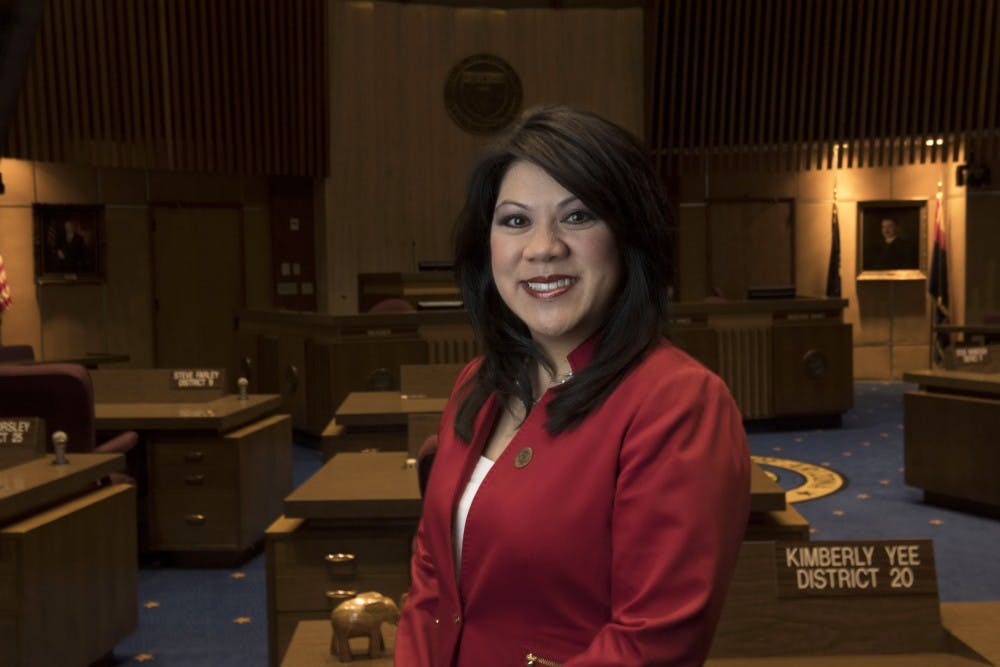The Arizona State Legislature serves as a breeding ground for debates on the future of state policy and has a new voice seeking to bring historically underrepresented demographics to the forefront of local politics.
Sen. Kimberly Yee became the state's first female, Asian-American legislator in 2010 and said she wants to inspire other people who come from minority backgrounds to get involved in the political process.
Although Arizona achieved statehood over a century ago, it wasn’t until 2010 when Yee gained a position as a state representative, thus becoming the first Asian-American woman to be elected into state legislature in the state’s history.
She was later elected to the Arizona State Senate in 2012. Yee is a Republican representing parts of Phoenix, Peoria and Glendale.
After graduating from Pepperdine University with a bachelor's degree and acquiring a master’s degree at ASU, Yee said she went on to spend most of her career working for elected officials.
“Never did I think I would run for office myself,” she said.
She said that prior to her appointment to the state legislature, she spent a lot of time being active in many campaigns that helped her better understand politics over policy.
Her status as the first female Asian-American to represent constituents at the state's capitol never crossed her mind while running for office, she said.
“The fact that I became the first Asian-American woman elected to office in legislature here in the state of Arizona’s history is truly an honor,” she said. “It certainly wasn’t something I was thinking about when I was in the process of running for office.”
Although she did not take her ethnicity into consideration while running, she said a statistical imbalance in the makeup of the state legislature does exist.
She said the reason behind the demographic imbalance of race in politics is partially because running for office is something that is not brought to attention of many Asian-Americans, due to their busy lifestyles.
“I know when I speak to Asian-Americans for instance, many of them are working,” she said. “They work to raise their families — they’re working, and they’re working, and they’re working.”
ASU senior Mischa Aurita, president of the Asian Business Leaders Association at ASU, said the lack of Asian-American representation in politics may be due to the prolonged pressure of stereotypes.
“We kind of stay timid, and we stay quiet, and we really don’t voice our opinions,” she said. “We are known for that submissive type of stereotype.”
However, Yee said she acknowledges her political career is an indicator that cultural diversity is growing in politics. She said she remains hopeful that growth will continue to flourish.
“There’s much more to be done,” she said. “But the work is being done, and that’s the good news.”
Yee said while there is a scarcity of representation across the board, there are ways in which politically hesitant voices from any background can be heard.
“The good news is that they can be involved in other ways,” she said. “They could not only become involved in the bills that we put forward, but if there is an issue that is of concern to them or their businesses or their families, they can tell us about it, and then we can run a bill to try to solve the problem.”
Simultaneously, Yee said a lack of political involvement from minorities can also simply stem from a general discomfort with politics.
“There are some people who aren’t comfortable in getting involved in politics; that’s not their thing and that’s okay,” she said. “But if I can encourage them to at least privately exercise their right to vote, that’s the first step.”
ASU senior Emily Kwon, president of the Asian/Asian Pacific American Students' Coalition at ASU, shares the same sentiment.
She said Yee's example is important in encouraging those from diverse communities to be more politically engaged.
“As society grows and evolves, we need to involve people of many different cultural backgrounds because they have that understanding,” she said. “They lived there. They lived that life and they can really understand.”
She said the diversity of ideas within passionate debates is what make the policy-making process useful.
“Our door really is open for people who agree with us or not, and that is part of the public debate process — it’s that you have individuals with diverse views,” she said.
Aurita said that while Kimberly Yee's example is a significant indicator of growth in political diversity, it shouldn’t overshadow her efforts and ideals.
“I don’t think race should be the main factor because that’s kind of unfair,” she said. “To just label her as (the Asian Senator) is kind of rude to her because she’s done so much.”
Leading up to election day, Yee said she will be trying her hardest to champion and advocate for further voter engagement and educational reform.
“Those are really important issues for me, and obviously public safety and healthcare are on the top of that list as well,” she said.
Yee said the political system isn't as scary as most people think and said there should be an adjustment in the public's impression of it to make sure more of the general public become involved.
“Sometimes public perception about politics is ugly," she said. "And that’s unfortunate."
She said that soundbites of political exchanges on the news and mass media usually show the most intense debate discussion, which makes state politics seem more aggressive than it actually is.
“After you have a passionate debate on the floor, whether you agree with that debate or not, the people who just had that debate will just walk off the floor talking about what they’re going to have for dinner together,” she said. “And that is truly is the reality — that we, across the aisle, are friends.”
Reach the reporter at angel.n.mendoza@asu.edu or follow @angelnikolas96 on Twitter.
Like The State Press on Facebook and follow @statepress on Twitter.




